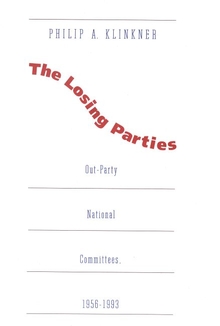The Losing Parties
WARNING
You are viewing an older version of the Yalebooks website. Please visit out new website with more updated information and a better user experience: https://www.yalebooks.com
Out-Party National Committees, 1956-1993
Philip A. Klinkner
Drawing on party documents, interviews with party officials, and contemporary accounts, Philip Klinkner provides detailed case studies of opposition party politics. He shows that Republican national committees have reacted to losses by making organizational changes to improve campaign technology and fundraising and that losing Democrats have sought to refine or make more democratic their internal procedures for selecting delegates to the national convention or for choosing presidential candidates. Klinkner suggests that the reasons for these reactions stem from the historical development of the parties. The organizational response of the Republican party is the result of its long-term relationship with business, its homogeneity and hierarchical structure, and its minority party experience. The Democrats' emphasis on participation and representation for its constituent elements is based on its characteristic composition of social and economic out-groups, its heterogeneity and decentralization, and its tradition as the majority party.
"An important and distinctive contribution to the study of party politics. The case studies of national committees are rich and informative and the writing style is both clear and readable."—Leon D. Epstein, University of Wisconsin-Madison
"Electoral defeat creates conditions conducive to political innovation and party culture affects the specific innovations that political parties adopt—that is the thesis of Philip Klinkner's excellent book. Using archival materials, party documents, and personal interviews, Klinkner carefully analyzes the respective changes that the Democratic and Republican national committees made after losing presidential elections. This book should be read by all scholars interested in the development of American political parties."—Paul S. Herrnson, Associate Professor, University of Maryland at College Park
"Drawing on party documents, press accounts, and interviews with nearly one hundred party figures, Klinkner skillfully tells how each out-party since 1956 has responded to losing the previous presidential election. . . . The book will make enjoyable and edifying reading."—John J. Pitney, Jr., American Political Science Review
"The Losing Parties is a thorough history of modern party committee leadership. It is a valuable contribution. . . . If the new direction the RNC appears to have taken signals a return to national policy leadership by party committees, Klinkner's historical comparisons will only become more important as new questions emerge about out-party direction. . . . A valuable contribution."—James Gimpel, Journal of Politics
Publication Date: September 10, 1994


